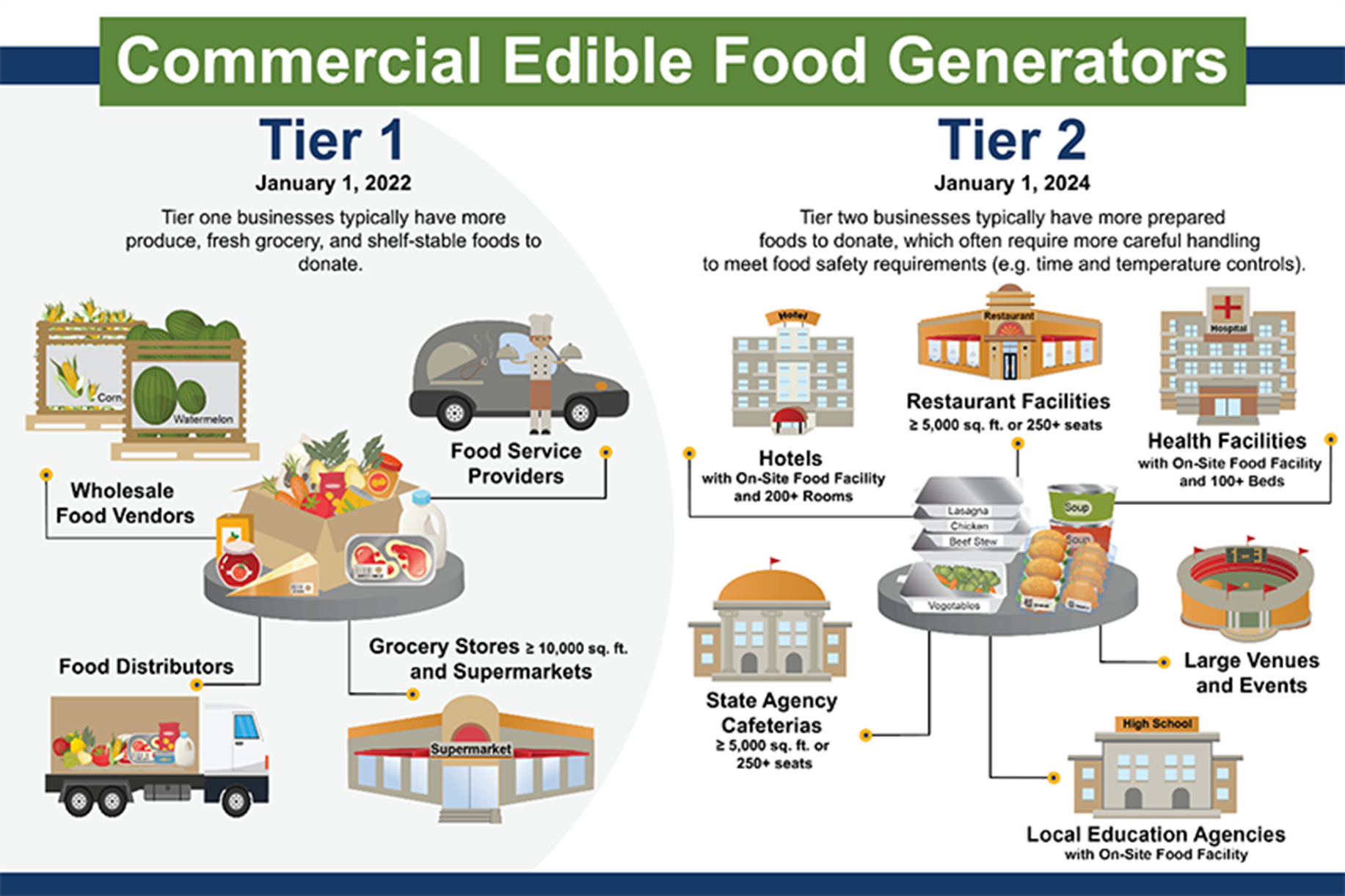Edible Food Recovery Program
Food recovery means collecting edible food that would otherwise go to waste and redistributing it to feed people in need. To reduce food waste and address food insecurity, the County of El Dorado will be developing an edible food recovery program to support local businesses and suppliers to manage their surplus of edible food – ensuring it will go to food banks, soup kitchens, and other food recovery organizations and services to help feed local community members in need.
Edible food includes but is not limited to:
- Prepared foods
- Packaged foods
- Produce
Food can often go unsold due to oversupply, size, appearance, labels, or age. Often this food is still edible and can be redistributed. Feeding hungry people through food recovery is the best use for surplus food and a vital way for California to conserve resources and reduce waste thrown in landfills.
Why It's Important
Californians send 11.2 billion pounds of food to landfills each year. A new law, Senate Bill (SB) 1383, requires each jurisdiction in California to implement an edible food recovery program, which will:
- Feed hungry people
- Create new jobs
- Strengthen relationships between food donors and food recovery organizations
- Help create sustainable funding for food recovery organizations
- Build more resilient communities
Implementing a food recovery program will also save landfill space and lower methane emissions.
Laws and Regulations
To reduce food waste and help address food insecurity, SB 1383 requires California to recover 20% of edible food by 2025 to feed people in need.
The law directs jurisdictions to establish food recovery programs and identify food generators to recover and donate the maximum amount of their edible food that would otherwise go to landfills. SB 1383 allows food donors to work with and deliver to food recovery organizations like food banks and pantries, soup kitchens, and food recovery services.
The law phases food donors under two tiers. The first tier is required to donate starting in 2022. The second tier is required to donate starting in 2024. Mandated food donors can help their communities now by starting to work with local food banks, food pantries, and other food recovery organizations and services.
Who is Required to Comply?
Commercial edible food generators:
Tier 1 – Tier one businesses typically have more produce, fresh grocery, and shelf-stable foods to donate. Tier 1 includes:
- Wholesale food vendors
- Food service providers
- Food distributors
- Grocery stores (greater than or equal to 10,000 sq. ft.) and supermarkets
All Tier 1 facilities will receive a letter outlining the requirements(PDF, 158KB).
Tier 2 – Tier two businesses typically have more prepared foods to donate, which often require more careful handling to meet food safety requirements (e.g. time and temperature controls). Tier 2 includes:
- Hotels with an on-site food facility and over 200 rooms
- Restaurant facilities greater than or equal to 5,000 sq. ft. or with over 250 seats
- Health facilities with on-site food facility and over 100 beds
- State agency cafeterias greater than 5,000 sq. ft. or with over 250 seats
- Local education agencies with on-site food facility
- Large venues and events
In addition, mandated food donors (Tier 1 & Tier 2 commercial edible food generators) are required to do the following in order to recover edible food before going to the waste landfill and be compliant with the law:
- Establish Contracts and Written Agreements with Food Recovery Organizations and Services - To ensure that the maximum amount of edible food is recovered, mandated food donors are required to establish contracts or written agreements with food recovery organizations and services.
- Recordkeeping - The law requires mandated food donors to maintain records of their food donation activities.

Where Can I Donate My Food?
There are both Federal and State laws that provide liability protections for good faith food donors.

Safe Surplus Food Donation
Food Recovery Services & Organizations in the El Dorado County Area
Food Bank Of El Dorado County
4550 Business Dr, Cameron Park, CA 95682
(530) 621-9950
Placer Food Bank
8284 Industrial Ave, Roseville, CA 95678
(916) 783-0481
Find a Local Food Bank for other locations
Additional Resources
More information about SB 1383 and food donor requirements can be found on the CalRecycle website.
For within the city limits of South Lake Tahoe, visit the City's Edible Food Recovery page.